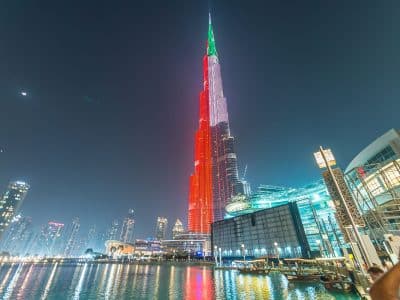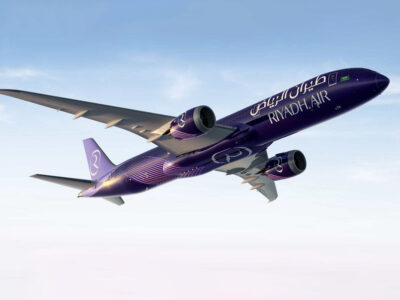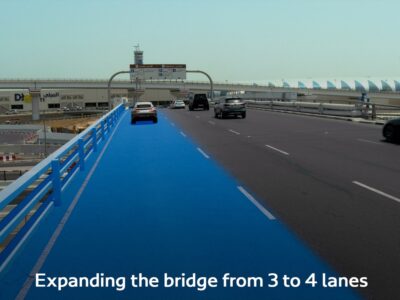For many hoteliers 2007 was a year in which they enjoyed success, with plenty of new properties opening, strong financial performance across nearly the entire region, and a continued maturing of the region’s hotel industry into a fully sophisticated market.
2007
Scorecard: 2007
Occupancies for the middle east and africa are at an all time high of 75% – Jean-Paul Herzog, Hilton hotels
According to Hilton Hotels president for Middle East and Africa Jean-Paul Herzog, the company had “an extremely successful year”.
“Our occupancies for Middle East and Africa are at an all time high of 75% – for the year to date to November 2007- with Egypt and the Arabian Peninsula performing strongly,” he said.
Looking at the performance during the first 11 months of the year, Hilton recorded a 19% RevPAR increase in the Arabian Peninsula and Indian Ocean region, a 7% RevPAR increase in Egypt and North Africa and 23% increase in Africa. Occupancy was strong, ranging between 71% and 79% across the three regions, while the average daily rate increased as much as 27% in Africa.
Coral International Hotels Resorts and Spas managing director Michel Noblet said the company did well in Saudi Arabia in addition to the UAE and Oman.
“With a double-digit increase in business, 2007 has been an amazing year for Coral,” he said.
“Since our projects are still under development in Africa, the Middle East was definitely the strongest market in terms of operations.”
Noblet said the average occupancy for UAE properties was 95%, 88% in Saudi Arabia and 92% in Oman.
2007 was a year of records for Rotana Hotels, according to chief operating officer Imad Elias.
“The properties under our management have performed extremely well, specifically in the United Arab Emirates, Khartoum and Syria,” he said.
“This of course excludes Rotana in Lebanon, which has strived throughout 2007 and fortunately achieved an average occupancy of 45%.
Michael Barnes, director of sales and marketing.
What was your hotel’s performance like in 2007?
Business in Bahrain is booming and getting better every year; we’ve surpassed expectations so far and hope to continue to do so in the future.
What do you expect business to be like in your country in 2008?
It looks like it will be another good year for us; business is growing all the time and going from strength to strength. The market here is mainly corporate, it’s not really a tourist destination as such, but things do seem to be changing. We have got a new water park, new shopping malls, so they should attract a different market in the future. But for the moment our business is 90-95% corporate.
Occupancy was particularly high for Rotana properties in the United Arab Emirates, which recorded average occupancy of 87%, and in Syria where the company achieved occupancy of 94.2%, with an average room rate of US $93.40. Across other markets, the company achieved occupancy of 51.4% in Kuwait, 59.2% in Sudan, 67.8% in Egypt and 59.2% in Beirut.
The Rezidor Hotel Group debuted its Park Inn brand in the region in 2007 with the opening of the Park Inn Sharm El Sheikh resort last November, and according to area vice president Jean-Marc Busato the company had a good year.
The forecast indicates that the year will close with a more than 25% increase in revenues compared to 2006 – Andreas Mattmuller, Movenpick hotels and resorts
“2007 proved to be a strong and successful year in terms of revenue and growth versus 2006, with the UAE, Saudi Arabia, Bahrain, Oman, and Kuwait all performing well,” he said.
“In general all destinations outperformed the 2006 results. The only exception to this was Lebanon where the ongoing situation is affecting the day-to-day business trends in Beirut.
Mövenpick Hotels and Resorts senior vice president Middle East and Asia Andreas Mattmuller said his company was another that was likely to post double-digit growth figures.
“It is still early to give final figures however the forecast indicates that the year will close with a more than 25% increase in revenues compared to 2006 and a similar amount of increase in gross operating profits for the Middle East and Asia region,”
he said.
“Some of this increase could be attributed to the openings of Mövenpick Hotel & Resort Al Bida’a Kuwait and Mövenpick Tower and Suites Doha. The region as a whole saw average occupancy of 68% at an average room rate of $176. RevPAR for the year to date is $119.70.”
Hyatt International Hotels and Resorts Middle East area director of marketing Thierry Bertin said the Egypt and Dubai were particularly strong markets for Hyatt.
“Our occupancies in the region grew by an average of 11%, and the average rates by an average of 16%,” he added.
For some companies, 2007 was not only a year of growth, but a time to prepare for the future, as InterContinental Hotels Group commercial vice president Tom Rowntree explained.
“2007 has been a year of significant growth in terms of property numbers, as well as a high level of planning to build the foundations of more development to come,” he said.
Tarek Lotfy, assistant director sales and marketing.
What was your hotel’s performance like in 2007?
Our hotel renovation started in 2006; at this stage we have completed the first phase of renovation, where a total of 144 rooms are now renovated. The second phase started in summer 2007, where we have a total of 218 rooms closed for renovation. We expect to close 2007 at 44% occupancy, average room rate of US $108.47 and RevPAR $77.89.
What do you expect business to be like in your country in 2008?
As regards to 2008, with the current trends we expect the season to higher by 10 to 15% than 2007.
Citing the company’s performance results through to September 2007, Rowntree said the Middle East had performed extremely well on the global stage, achieving RevPAR growth of 18% compared with a global growth figure of 6%.
“Overall, IHG performed well throughout the region, which the results reflect,” Rowntree said.
2007 has been a year of significant growth in terms of property numbers, as well as a high level of planning to build the foundations of more developments to come – Tom Rowntree, Intercontinental Hotels Group
Properties in Dubai, Ajman and Abu Dhabi performed particularly well not only in the region but across Kempinski Hotels’ global portfolio, according to the company’s Middle East and Africa president Ulrich Eckhardt.
“The UAE market is very strong in terms of inbound tourism, and most of the supply came from the GCC, CIS and Germany,” he said.
In addition to the traditionally strong market of the United Arab Emirates, Starwood Hotels and Resorts enjoyed a good year in Saudi Arabia in 2007, according to Middle East regional director and vice president Guido De Wilde.
“2007 was another great year, driven by Starwood’s marketing and sales engines, its strong regional and global presence and its focus on optimal service delivery and its constant commitment to its guests, associates and local communities,” he said.
“This was complimented by a solid market growth and dynamic economies across the Middle East. Performance was particularly strong in the United Arab Emirates and Saudi Arabia. The average rate for the region grew 11% over 2006 and RevPAR was up close to 16% compared to last year.”
Accor Hospitality Middle East and Africa chief operating officer Jean Luc Motot said the company’s performance was up four points in occupancy and 8.5% in RevPAR for the 11 months to November 2007.
“Egypt has shown a very good recovery [compared with] last year and the trend for end of the year and beginning of 2008 is quite positive,” he said.
“Plus the Sofitel El Gezirah in Cairo – fully opened since October – is having an amazing start above our predictions.
“Morocco was quite flat for the first six months but since mid-summer there was much better business activity, especially at the end of the year. In the Middle East the UAE and Bahrain definitely remain the growth boosters with almost all our properties scoring above 80% year-to-date occupancy. Qatar also keeps a strong competitive position.
Last year was also a success for the Jumeirah Group, according to chief sales and marketing officer Apo Demirtas.
Najem Khalil, marketing manager.
What was your hotel’s performance like in 2007?
Considering the youth of the property, this year has been an extremely successful year for Kempinski Hotel Ishtar Dead Sea. At present we do not have the final numbers for 2007, however the resort has enjoyed occupancy that has been above and beyond our initial expectations. The demand over the next couple of months is quite high, perhaps due to the success of recent marketing initiatives and trade show presence in foreign markets this year.
What do you expect business to be like in your country in 2008?
Travel to Jordan has been on the rise for the past few years, with a 13% increase from 2005 to 2006, and we expect this number to increase further going into 2008. While travellers from the Gulf dominate Jordanian tourism, European and American travelers are becoming increasingly attracted to Jordan. In particular the Jordan Tourism Board is looking to improve its exposure in existing but under-exploited markets, as well as developing new ones such as Russia, China, India, Kazakhstan and Turkey. In regards to Kempinski, there will be a property opening in Aqaba in June 2008. The opening of this resort will be the third property in Jordan, showing Kempinski’s interest and commitment to this area, as well as strategically observing that tourist numbers are rising in Jordan.
“We are well on track to achieve our ambitious worldwide growth plans to expand our portfolio to 57 by 2011, with 13 properties currently under development in Dubai, Abu Dhabi, Aqaba, Doha, Phuket, Shanghai, Bermuda, Mallorca and London,” Demirtas said.
“We have enjoyed significant growth in both hotel occupancy and average rates for our hotels in Dubai in 2007, and we are confident that this trend will continue in the next years to come.”
Occupancies in the region grew by an average of 11%, and the average rates by an average of 16% – Thierry Bertin, Hyatt International
For Marriott International, Egypt and Saudi Arabia were particularly strong, although Middle East and Africa area director of sales and marketing Jeff Strachan said the company had “a fantastic year across all countries”.
“Overall the year was fantastic, with 20% growth year on year for the Middle East and Africa,” he added.
Fairmont Hotels and Resorts executive director sales and marketing Middle East and Africa Kent Cooper was similarly upbeat about the company’s performance last year.
“2007 has seen tremendous growth for the company, as well as the completion of major renovation programmes, providing our guests the best experiences a destination has to offer,” he said.
With new hotels announced for Oman and Cairo, Cooper said existing properties performed strongly – Dubai recorded 80% occupancy for the 11 months to November 2007, Kenya properties were at 55%, and Cairo chalked up occupancy of 70%.
Finally, Emirates Hotels and Resorts also achieved success in 2007, with results coming in above budget according to resorts and projects vice president Tony Williams.
“We are extremely happy with the financial performance in 2007,” he said.
“There was a noticeable increase in costs in Dubai – many related to food imports and price increases from local distributors – however our operations have coped with this very well.
“Al Maha Desert Resort & Spa has achieved occupancy levels of 80%, which is impressive as it remains a unique resort within Dubai. An increase in demand from our traditional core markets – UK, Europe and Japan – was bolstered by very good increases in the local market, as more residents get away from the city over weekends and holiday periods to visit easy-to-reach, high-quality leisure destinations closer to home. There has also been a steady growth in demand by local and GCC markets for the conference facilities offered by Al Maha Desert Resort & Spa.
“Our first city-based property Marina Hotel & Residence – which will be re-branded as The Harbour Hotel & Residence in January 2008 – has exceeded expectations during its soft opening period. We registered good demand for long-term stays, bolstered by short-term demand from leisure and business travellers, and Dubai’s corporate market.
Rabih Al Atrash, assistant director of sales and marketing.
What was your hotel’s performance like in 2007?
The hotel’s soft opening was in February 2007 with only five floors open, and that period was very important for the hotel’s sales team and operation team for getting new business to the hotel and ensuring that everything went smoothly. We started full operation in April 2007, and got 30% to 40% occupancy for the first two months, however occupancy tremendously increased after six months with an average room rate of KWD 59 (US $215).
What do you expect business to be like in your country in 2008?
With the steadfast growing economic situation especially in oil and gas industry, and because of the trust we have gained among the oil and gas companies and the Kuwaiti communities, the hotel is expecting 68% occupancy for next year with an average room rate of KWD 62 ($225).
2007 activity
Last year saw a flurry of hotel openings across the region, with more than 7500 rooms added to the Middle East’s inventory through a further 35 properties from the big names. However with political instability in some regions, and construction delays caused by a shortage of labour and materials in other markets – most noticeably Dubai – the number of properties that opened was not as high as some expected.
With seven properties opening, contributing more than 1700 rooms (not including the extension of the Novotel Sharm by 200 rooms and Novotel Dahab by 40 rooms), Accor was the most active of the big industry players in the region in terms of new openings.
The demand for affordable quality accomodation in dubai is still growing, which will be a supporting factor for the success of the new hotels – Thomas Gertz, Bavaria Hotels International
The InterContinental Hotels Group was not far behind with six openings contributing 1419 rooms – including the company’s 150th InterContinental branded property worldwide, the 500-room InterContinental Dubai Festival City.
IHG also reopened its properties in Abu Dhabi and Nairobi.
Looking at the year’s activity from a portfolio expansion perspective, Rotana Hotels and Resorts achieved the best performance, inking deals to deliver more than 4700 keys across 16 properties.
Coral International Hotels Resorts and Suites was not far behind with 15 properties, but lower room counts meant the company added 2500 keys – placing it sixth on the list.
Accor was the second best performing in terms of room count, with 3200 rooms being signed to its inventory, while InterContinental is probably the true leader in this category with 12 deals adding 2875 rooms to the mix, and a further 12 properties signed in Saudi Arabia under a franchise agreement.
In terms of players new to the market, or without an already established presence, Swiss Belhotel International was the best performing, with the Hong Kong-originating company signing eight properties for a total of more than 1400 rooms.
Limited service company Premier Inn added four flags for another 1038 rooms, and newly launched Tamani Hotels and Resorts announced three properties for 687 keys – as the company is an owner/operator it did not sign any management contracts.
Overall, management contracts signed by the big industry players in 2007 will add more than 140 properties – and more than 33,700 rooms – to the regional market in the coming years.
Berthe Barakat Maacaron, director of sales.
What was your hotel’s performance like in 2007?
Concerning year 2007, we did not have as good a year as we had expected, due to our hectic political situation here in Lebanon.
What do you expect business to be like in your country in 2008?
Many group bookings were postponed until 2008. We hope the presidential elections will be done as soon as possible, in order to establish our business situation for this year
2008
Coming soon
Middle East hoteliers can expect more competition this year, with an extra 80 properties slated to open, contributing more than 20,000 rooms to the regional inventory.
As long as we are able to manage our growth in an efficient way then we will take further properties, as we are extremely cautious on expanding strategically and efficiently – Imad Elias, Rotana hotels
IHG leads the pack in terms of keys scheduled to open this year, with 10 properties set to deliver more than 2600 rooms.
After walking away from its property in Doha during 2007, Bavaria Hotels International will be looking to re-enter the Middle East market with two properties; the Bavaria Executive Suites Dubai and Bavaria Executive Suites Sharjah. The Dubai property alone will have 2100 rooms, adding 5400 beds.
Bavaria chief executive Thomas Gertz said the company’s policy was to deliver “a high performance working and living environment at an affordable rate”.
“[Once the Dubai property opens] we will be able to target a wide variety of markets and potential customers, increasing the opportunities for success,” he said.
“Of course the demand for affordable quality accommodation in Dubai is still growing, which will be a supporting factor for the success of the new hotels.
Coral International will open the most properties in the region, with 12 properties for a total of 1800 rooms, while Accor has plans to open 11 properties which would contribute more than 2100 rooms to the regional inventory.
In terms of market debuts, 2008 promises to deliver new products from Tamani Hotels and Resorts and Premier Inn, which expects to open its first limited service property in March at Dubai Investment Park in the United Arab Emirates before expanding to Abu Dhabi, Oman, Saudi Arabia and Turkey in later years.
Future flags
For many hoteliers planning further expansion in the Middle East, the United Arab Emirates, and more specifically Dubai, remain the key targeted markets.
Saudi Arabia was second, followed by the wider GCC, Egypt, Qatar, Jordan, Kuwait and Oman.
South Africa and Morocco were also highlighted as key markets for hoteliers eying expansion opportunities.
Rotana’s Elias said the company was focused on all markets where properties have been announced as opening.
“Our main priority is to have a property in the main cities in Saudi Arabia and in Cairo,” he said.
Stephen di Renza, proprieter of Riad9.
What was your hotel’s performance like in 2007?
Performance for Riad9 Fez Medina exceeded all expectations in 2007. Occupancy rates increased 42% to 77% and RevPAR from EUR 200 to 289 (US $287-$415). We are only in our second year of operation which obviously accounts for some of the increased activity, but a large part is also due to the number of discount airlines opening direct flights from major euro-cities such as Frankfurt, Barcelona, Marsailles – 80% of our clientele is arriving on these flights.
What do you expect business to be like in your country in 2008?
We’re expecting 2008 to be excellent and are expanding accordingly. Riad9 has been featured prominently in the European press and on television in the UK and France, which has already brought reservations extending to September 2008. On a national and city level, Morocco has made great efforts to communicate to international travellers. The city of Fez has also made headway getting its Sacred Music and Culinary Festivals on the radar of potential visitors.
My personal estimation for 2008 would be a 15- 20% increase in the number of tourists visiting Morocco.
“We are currently negotiating several other projects but we are keen on taking the ones that would guarantee a healthy return to the owners and those that would add value to our brand. But we welcome any other appropriate opportunity in the remaining Arab states. As long as we are able to manage our growth in an efficient way then we will take further properties, as we are extremely cautious on expanding strategically and efficiently.”
We’ve had our eyes on the fast growing cities in theGCC region, in addition to select resort destinations in the Middle East – Guido De Wilde, Starwood hotels
Dusit International Middle East regional vice president Sam-Erik Ruttmann said: “we have strategies in place and will focus on GCC, Middle East and North Africa”.
Starwood’s De Wilde said the company’s development pipeline “has never been so robust”.
“In addition to the deals we’ve signed lately, we’re also close to making few more announcements,” he said.
“We’ve had our eyes on the fast growing cities in the GCC region, in addition to select resort destinations in the Middle East.
According to Jumeirah’s Demirtas: “2008 promises to be another successful year for us with hopefully more exciting news when it comes to our expansion plans both locally and internationally”.
“Our growth strategy sees us expand into either gateway or letterhead cities or aspirational resort destinations,” he said.
“If you look at some of the hotels and resorts currently under development you can clearly see what that means to us: key gateway cities such as Shanghai, London, New York, Abu Dhabi and Doha alongside resort destinations such as Bermuda, Aqaba and Phuket. With that being said, we will also look at destinations not currently earmarked as priority cities, providing the development fits with our brand values and the project can yield the commercial success of other Jumeirah projects.
Success secrets
Hoteliers had mixed views on the secrets to success in 2008.
Emirates’ Williams said the company was blessed with a diverse portfolio of product offerings.
“By offering a varied product range comprising a conservation-focussed yet luxurious desert resort, a city-based hotel, and full serviced apartments we cater to all types of corporate and leisure travellers seeking short and long term stays in Dubai,” he said.
K.V. Raj, general manager.
What was your hotel’s performance like in 2007?
The Ruwi Hotel performance for the year 2007 has been excellent, with the occupancy level as high as 90-95% and an average rate of approximately US $80-90. The business boom in the country has helped us raise the occupancy level to the maximum and this also includes the tourism sector, which shows a lot of potential for the future.
What do you expect business to be like in your country in 2008?
The year 2008 looks bright and the same trend of high occupancy with better average rate is expected to continue further
“We will continue to work closely with our trade partners from the tour operator and DMC market, and at the same time we will build relations with corporates to increase market share.
It is going to be challenging to recruit and maintain skills and talents in the middle east – Ulrich Eckhardt, Kempinski hotels
IHG’s Rowntree agreed with Williams on the need for a diverse product portfolio.
“Alongside a robust growth strategy across five tiers of hotel brands, IHG is focused on differentiating its brands to meet the demands of all types of traveller,” he explained.
Maintaining “hospitality excellence” will be the key to Fairmont’s success, according to Cooper.
“Today’s savvy travellers are looking for unique, distinctive experiences to enrich their travels, commemorate milestones or celebrate time with family and friends,” he explained. “Our collection of landmark hotels is unparalleled and our partnerships within our destinations allows us to offer guests fantastic experiences which enhance their travel.
For Strachan the key to Marriott’s success is simple: people.
“Our associates [will be the key] – they are always the key to our success,” he said.
Tamani Hotels and Resorts chief executive Alain Geurnier said the key to the company’s success would be its delivery of a unique product to the market, and an “aim to raise the benchmark in hotel service”.
“We will offer traditional Islamic hospitality with a modern twist, he said.
“Service will be impeccable. Our F&B team will focus on healthy cuisines made with the very best natural ingredients. Health will be a main focus of our hotels, with each property offering an extensive range of facilities from gymnasiums to spas, health centres and wellness zones.
“Each hotel will also act as a showcase for Middle Eastern and Islamic artists, whether these are local talents or internationally renowned ‘creatives’. Public areas, such as the lobby, will be decorated with Middle East-inspired art pieces, and some of our properties will even include a dedicated museum. For the hotel guest, this will be a completely fresh and holistic approach to hospitality.”
Building strong international brands will be the key to Accor’s success, according to Motot.
Chakid Lahlou, director of sales and marketing.
What was your hotel’s performance like in 2007?
The current market situation in Riyadh has shown 2007 to be a record year in terms of occupancy and revenue. The corporate demand has increased by 15% compared to the previous year and we’re enjoying high occupancy levels throughout the year regardless of the summer season; that used to be very low demand period.
What do you expect business to be like in your country in 2008?
More projects are in the pipeline, and the Kingdom budget that was announced three days ago is showing that the financial strength is there. Now surely new mega-projects will be launched during 2008, and will contribute to high business demand enabling us to further develop our corporate segment, which has great potential. We anticipate 10% market growth during 2008.
Adrian Hearn, director of sales and marketing.
What was your hotel’s performance like in 2007?
We performed above corporate expectations in all months.
What do you expect business to be like in your country in 2008?
We expect strong first, second and fourth quarters, but a soft June, July, August and September. We predict increased groups demand in the strong months, especially from the local market, and increased leisure traffic from the local market and GCC throughout the year. I believe we will also see increased traffic from sports and ministry guests, both in transit and in groups, throughout the year
“A high level of service in our hotels means motivated people” he explained. “So we do work to develop programmes to attract talented people and keep them. One of our competitive advantage is the training programmes – Academy Accor – that we use to provide staff all around the world with specific tools.
One challenge which is always a talking point is the retention of middle and senior management employees – Jean-Marc Busato, The Rezidor Hotel Group
Kempinski’s Eckhardt said good positioning, yielding and key account management would drive the company’s regional success.
“These would be the key value drivers to secure high yielding business throughout the year,” he said.
“Another major factor would be managing human resources through 2008; with all the new hotels opening and main labour feeder countries diminishing in terms of labour supply, it is going to be challenging to recruit and maintain skills and talents in the Middle East.
Mövenpick’s Mattmuller agreed with Eckhardt that human resources would be critical to the company’s future.
“The key to success is in developing a system of recruitment, reward and development that will engage people with our company,” he said.
“Once we find and hire the right person we need to be able to provide an employment experience and career opportunities that will build loyalty. More than ever, the old adage of ‘hiring for attitude and training for skills’ rings true. It is essential that we employ people with potential and then have structures and programmes in place that help people reach that potential to ensure that with the influx of new people into the company we retain our identity and standards of customer service.
Developing the full potential of Hilton’s brands would be key to the company’s success in 2008, Herzog said.
“Our belief is that consumers should be able to choose between a multitude of brands each offering a different product for a different market segment,” he added. “Consumer choice is key to future growth. This choice that we offer customers with brands that span the range from luxury to economy sectors will ensure our lead in the region in 2008.
Challenges
There is one word for the challenge keeping hoteliers awake at night in the Middle East region: people.
Of the 19 hoteliers who responded to Hotelier Middle East’s questions, 15 selected staffing or human resource issues as a challenge for 2008.
Markus Iseli, general manager.
What was your hotel’s performance like in 2007?
We are very pleased with the overall performance of the hotel in 2007 and we are expecting to increase our occupancy rates by approximately 11% and a 24% increase in RevPAR over last year.
What do you expect business to be like in your country in 2008?
All assumptions indicate that we will continue to experience good growth for 2008 especially from the local, regional corporate and group segments. Damascus has also just been voted the top destination in the Middle East (Conde Nast Traveller 2007 Readers’ Awards) and the Arab Capital of Culture in 2008 so we are hoping to also see a good increase in our regional and international leisure segments as wel
Yves Tarabout, director of sales and marketing.
What was your hotel’s performance like in 2007?
The business demand for Dubai has been stronger than ever and the results of 2007 were the best the Sheraton Dubai Creek Hotel and Towers ever achieved. We expect to close the year with around 93% occupancy and an average rate of above AED1000 (US $270). Moreover, one major factor noticed in the past year is that Dubai no longer has a low season. During the summer we do need to be more flexible on rates, but occupancy remains above 90% for most of the hotels.
What do you expect business to be like in your country in 2008?
2008 is set to be another fruitful year for Dubai’s hotel industry. The increase in rooms available may stabilise the occupancy growth, however the demand should remain strong with some changes in the city’s feeder markets. The key to Dubai’s success will be its capacity to attract customers from new parts of the world while maintaining the visitor base from our main markets. As a final point the combined efforts between Airlines, DTCM and hotels will definitely contribute to make 2008 another exciting yea
Other challenges included maintaining service quality levels, the threat of increased competition from further openings, the political stability of the region, the challenge of launching new brands or repositioning and maintaining existing brands and the rising costs of construction and land values.
“One challenge which is always a talking point is the retention of middle and senior management employees,” said The Rezidor Hotel Group’s Busato.
“If you consider the number of new developments currently planned just in the UAE alone, many senior positions will be sourced during 2008/09, and companies entering the region will focus on experience and local market knowledge.
Coral’s Noblet agreed.
“Human resources and training is definitely one of the biggest challenges facing hospitality today,” he said.
Swiss-Belhotel International Middle East regional director of operations Phillip Norman said the number of new hotels meant the issue of staff availability continued.
“Whether the traditional Indian workforces currently employed across the region will choose to return to their own booming sector is still not certain,” he said.
“Furthermore, the environmental impact on the natural resources of the region is causing huge debate, which Swiss-Belhotel International is paying extreme attention to in term of energy saving, water conservations and water management. [And] additional rooms will definitely affect the average room rate, and having a high RevPAR will be the biggest challenge to all.
Crystal ball
While hoteliers can’t exactly predict the coming 12 months and beyond, there is a lot of excitement about the possibilities and opportunities that remain in the marketplace.
Many of the big industry players indicated they would be launching new brands in the region next year, with names such as Accor, IHG, Hyatt, Rotana, Coral, Rezidor, Starwood and Jumeirah among those suggesting a change.
Although on a micro-level more than 80 properties are gearing up to open next year across the region, in global terms hoteliers eyes remain fixed on the looming weakening of the US economy and the rise of the double headed market giants in India and China.
Questions remain about the region’s ability to maintain strong financial and performance growth for another year, and whether a double-digit percentage growth continues to be sustainable.
Mustafa Çiplak, general manager.
What was your hotel’s performance like in 2007?
Ephesus Boutique Hotel is a new hotel which has only been open a year. Most of the clients who come here these days do not want to be in a big five-star hotel, so we decided there was a market for a small property which still offers all the comfort a client would expect from a large five-star hotel. This year our occupancy has been about 60% which, for the first year, is above our expectations.
What do you expect business to be like in your country in 2008?
For the start of 2008, 50% of our rooms are already booked up. We hope to have very good year and build on the success of 200
Mirella Furlanello, general manager.
What was your hotel’s performance like in 2007?
Business has been fairly slow because this has been our first year, but it has been getting busier these past few months. We’re also quite a unique concept over here, as we are the only four-star property in Sanaa, so it’s a unique idea that takes time to take off.
What do you expect business to be like in your country in 2008?
Next year we plan to build on the foundations of 2007. The tourism market here is getting better, and providing nothing happens to stop the industry moving forward I think we will see more visitors to the area. It’s a very unique country with a lot of possibility for tourist







